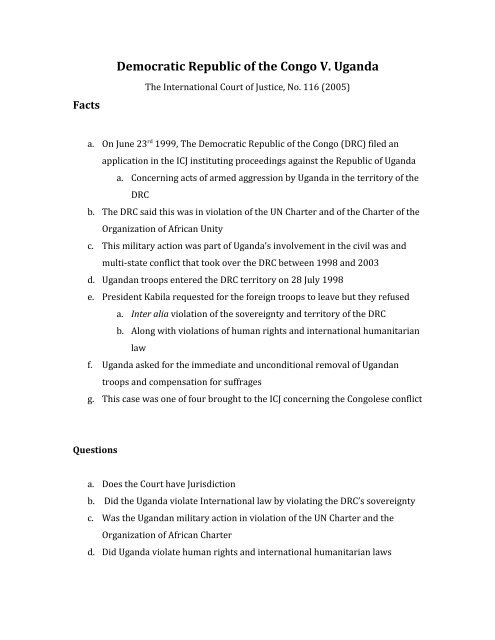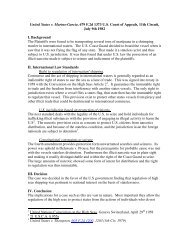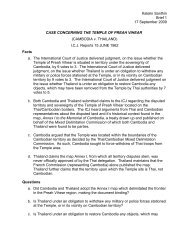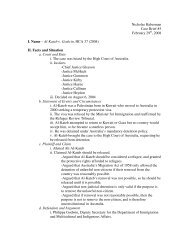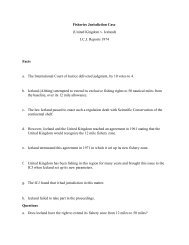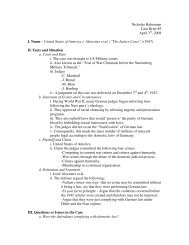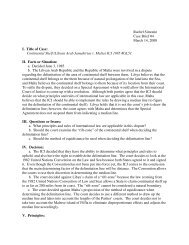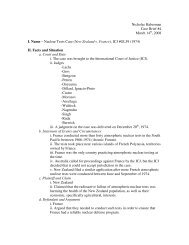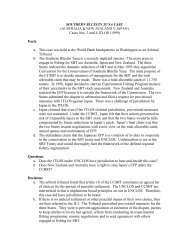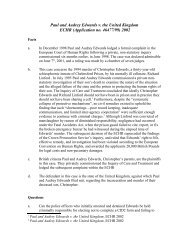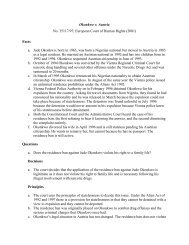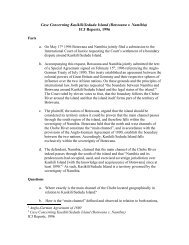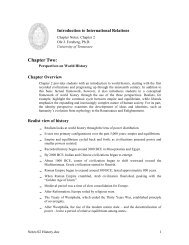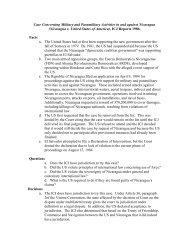Democratic Republic of the Congo V. Uganda - Courses
Democratic Republic of the Congo V. Uganda - Courses
Democratic Republic of the Congo V. Uganda - Courses
You also want an ePaper? Increase the reach of your titles
YUMPU automatically turns print PDFs into web optimized ePapers that Google loves.
<strong>Democratic</strong> <strong>Republic</strong> <strong>of</strong> <strong>the</strong> <strong>Congo</strong> V. <strong>Uganda</strong>FactsThe International Court <strong>of</strong> Justice, No. 116 (2005)a. On June 23 rd 1999, The <strong>Democratic</strong> <strong>Republic</strong> <strong>of</strong> <strong>the</strong> <strong>Congo</strong> (DRC) filed anapplication in <strong>the</strong> ICJ instituting proceedings against <strong>the</strong> <strong>Republic</strong> <strong>of</strong> <strong>Uganda</strong>a. Concerning acts <strong>of</strong> armed aggression by <strong>Uganda</strong> in <strong>the</strong> territory <strong>of</strong> <strong>the</strong>DRCb. The DRC said this was in violation <strong>of</strong> <strong>the</strong> UN Charter and <strong>of</strong> <strong>the</strong> Charter <strong>of</strong> <strong>the</strong>Organization <strong>of</strong> African Unityc. This military action was part <strong>of</strong> <strong>Uganda</strong>’s involvement in <strong>the</strong> civil was andmulti-state conflict that took over <strong>the</strong> DRC between 1998 and 2003d. <strong>Uganda</strong>n troops entered <strong>the</strong> DRC territory on 28 July 1998e. President Kabila requested for <strong>the</strong> foreign troops to leave but <strong>the</strong>y refuseda. Inter alia violation <strong>of</strong> <strong>the</strong> sovereignty and territory <strong>of</strong> <strong>the</strong> DRCb. Along with violations <strong>of</strong> human rights and international humanitarianlawf. <strong>Uganda</strong> asked for <strong>the</strong> immediate and unconditional removal <strong>of</strong> <strong>Uganda</strong>ntroops and compensation for suffragesg. This case was one <strong>of</strong> four brought to <strong>the</strong> ICJ concerning <strong>the</strong> <strong>Congo</strong>lese conflictQuestionsa. Does <strong>the</strong> Court have Jurisdictionb. Did <strong>the</strong> <strong>Uganda</strong> violate International law by violating <strong>the</strong> DRC’s sovereigntyc. Was <strong>the</strong> <strong>Uganda</strong>n military action in violation <strong>of</strong> <strong>the</strong> UN Charter and <strong>the</strong>Organization <strong>of</strong> African Charterd. Did <strong>Uganda</strong> violate human rights and international humanitarian laws
Decisionsa. The ICJ does have jurisdictionb. The court found that <strong>Uganda</strong> did violate <strong>the</strong> international principles <strong>of</strong> non-use<strong>of</strong> force and Non-intervention with its armed activities between August 1998and June 2003a. The magnitude and duration <strong>of</strong> <strong>the</strong>ir military intervention was a hugeviolation <strong>of</strong> Article 2(4) <strong>of</strong> <strong>the</strong> UN Charterc. <strong>Uganda</strong> was also to be found in violation <strong>of</strong> human rights law and internationalhumanitarian lawd. However <strong>the</strong> Court ruled in favor <strong>of</strong> <strong>Uganda</strong> concerning <strong>the</strong> violated obligationsthat <strong>the</strong> DRC owed to <strong>Uganda</strong> under <strong>the</strong> Vienna Convention on DiplomaticRelationse. The Court granted <strong>the</strong> DRC’s request for reparations, noting under prior precedent itis “well established in general international law that a State which bears responsibilityfor an internationally wrongful act is under an obligation to make full reparation for<strong>the</strong> injury caused by that act.”Principlesa. Human Rights laws and International humanitarian lawb. The principles <strong>of</strong> non-use force and non-intervention principles in <strong>the</strong> UNconventionc. Sovereignty and territoryConclusionsThis case has resonated in <strong>the</strong> ICJ as one <strong>of</strong> <strong>the</strong> hardest cases to ever pass through it.Overall <strong>Uganda</strong> was in violation <strong>of</strong> many different international principles with itssustained military actions in <strong>the</strong> DRC. The ICJ was responsible for considering all
facts presented to <strong>the</strong> court. The relevant facts were not at dispute it was how <strong>the</strong>court should look at <strong>the</strong> facts.BibliographyThe <strong>Democratic</strong> <strong>Republic</strong> <strong>of</strong> <strong>the</strong> <strong>Congo</strong> v. <strong>Uganda</strong>, No. 116, The International Court <strong>of</strong>Justice (2005)SubmittedZuri H Malick , November 18, 2009


